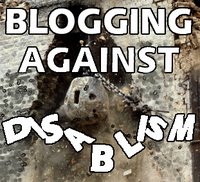Some time ago,
BBC Ouch, the BBC's disability webpages, ran a survey of its readers'
Worst Words relating to disability. The
results were as follows:
Total votes cast: 2053
1. Retard 19.6% (404 votes)
2. Spastic 18% (373 votes)
3. Window-licker 17% (350 votes)
4. Mong 13.4% (276 votes)
5. Special 10.2% (210 votes)
6. Brave 7.9% (163 votes)
7. Cripple 5.5% (113 votes)
8. Psycho 2.9% (60 votes)
9. Handicapped 2.5% (52 votes)
10. Wheelchair-bound 2% (42 votes)
Interestingly, they also have a
chart of the different results as divided by
disabled and non-disabled respondents to the survey.
I have mostly unpleasant gut responses to many of those words, but one of my own
worst words in terms of offensive terms used against disabled people is
nutter.
I hate this word. It hits me like a punch in the stomach, it makes me sad, scared and angry. Its implications are, in my experience, ones of violence and aggression, as well as mental illness. Those links are all too prevalent in much of the widespread opinions and thoughts about mental illness, and people who experience it.
Many of us work incredibly hard to break the links constantly. We have statistics! We have facts!
Did you know that people with mental illness are much more likely to hurt themselves than anyone else?
Did you know that people who have mental illnesses are victims of crime more often than those who don't?
Did you know that the most dangerous group in society, those most liable to commit violent crimes, are young men who drink?
The media really doesn't help. You may remember the 'Bonkers Bruno' headline in the sun, or Osama bin Laden being described as 'psychotic'. 'Schizo', 'Psycho', 'Maniac', 'Mad' are all words which are used prolifically in headlines and stories designed to alarm and rouse people's fears and opinions.
The media has so much power to spread correct information and to break stigmatic associations with mental illness, but instead it grabs the
Mad, Bad, Dangerous headlines and exploits and glorifies them.
Mental illness and violence are different things. Using the same words to describe both, or borrowing a word from one to use to discuss the other all do an incredible disservice to the 1 in 4 people in Britain who will experience mental distress at some point in their life.
There is more than enough stigma already, it is hard enough already to ask for and receive support and help for anxiety, depression, hearing voices, paranoia, or whatever may strike. The proposed changes to the Mental Health Bill don't help, the media don't help, and the rantings of uninformed people who are happy to blame all the world's (street's, town's, room's) ills on the poor sods who are easily available to target because they may talk to themselves, or hide away, or cry a lot.
Using stigmatising language, and constantly making connections between mental illness and violence - connections which don't exist in any objective study! - creates fear and hate, and does nobody any good.
As someone witty said at the time shortly after September 11th 2001,
"If Osama bin Laden is being described at psychotic, it must be because of his mistaken belief that large numbers of people are out to get him".

---
Technorati tags: Blogging against Disablism Day; disability; incurable_hippie; mental illness; mental health; stigma.










